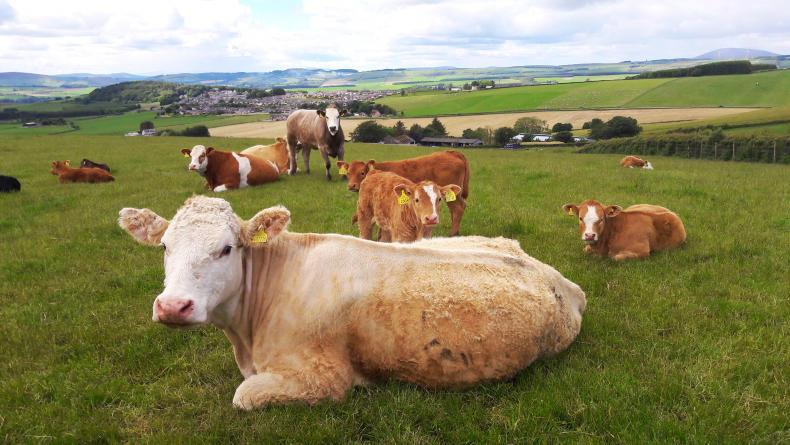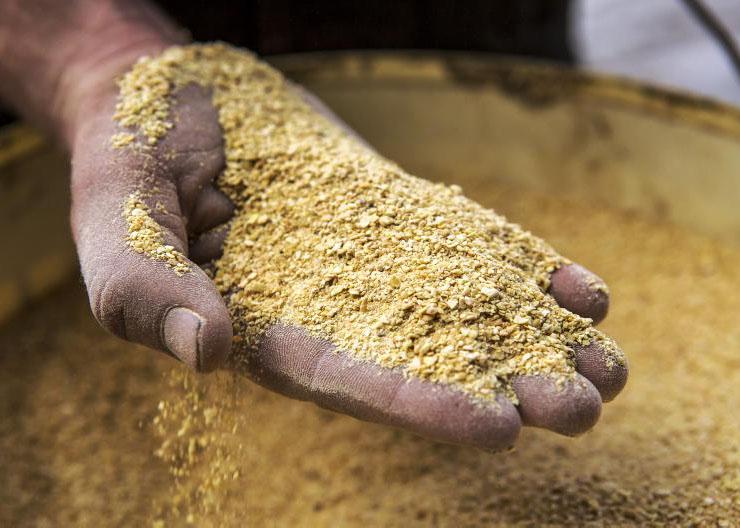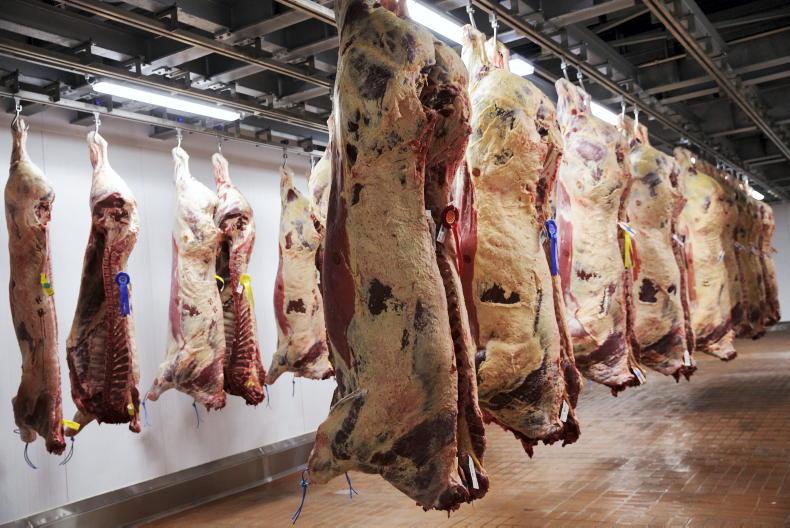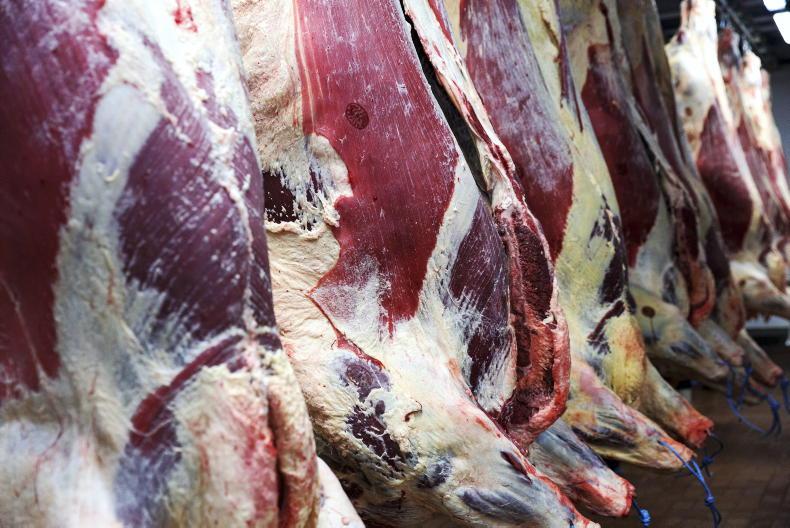A comprehensive 123-page study undertaken by experts at the Leicestershire-based Andersons Centre on behalf of British red meat levy bodies, including Quality Meat Scotland, has warned that a no-deal exit from the EU will be disastrous for the UK beef and sheep industry.
As part of the work, the report authors scrutinised various trade flows and tariffs, looked at other barriers to trade, and interviewed key leaders within the UK red meat industry.
The report concluded that nine to 12 months after the EU exit, UK lamb prices could be down at least 24% in a no-deal scenario. On beef, the impact is less devastating, but prices would still be back 4%, and that decline could be greater depending on what happens at the Irish border.
However, in a scenario where the UK and EU agree a Brexit deal that involves a free trade agreement as well as a customs arrangement that effectively aligns the UK with EU regulations, then the impact on producer prices is minimal.
Developments
The study is different to those that have gone before, as it tries to take into account more recent developments, including the impact of the temporary tariff regime in a no-deal exit published by the UK government in March 2019.
On beef, the UK proposed that current EU tariffs would mostly be halved, and at the same time it would create a new 230,000t beef quota open to exporters from any part of the world.
The UK plan for sheepmeat is different, and it intends to apply the same tariffs as the EU on imports
In addition, to keep the Irish border open, the UK signalled that it would impose no checks or tariffs on goods passing from Ireland into Northern Ireland.
There would then be nothing to stop these goods going across the Irish Sea to Britain.
However, the UK plan for sheepmeat is different, and it intends to apply the same tariffs as the EU on imports.
On the face of it that might seem positive, but as Andersons point out in the latest report, this doesn’t address the major issue facing the British sheep industry – the 72,700t net trade surplus in sheepmeat between the UK and the EU.
With UK sheepmeat imports from the likes of New Zealand predicted to continue, the UK market is oversupplied and prices would fall
With the UK outside the EU, it would then face high EU tariffs on meat exports to the continent.
That would leave sheepmeat exports to the EU “almost completely wiped out”, predicts Andersons.
With UK sheepmeat imports from the likes of New Zealand predicted to continue, the UK market is oversupplied and prices would fall. Lower prices would stimulate higher consumption, but the overall impact is a 24% decline in produce prices, predicts Andersons.
Beef impact
On beef, the report authors also highlight the impact that tariffs would have on trade flow if there is no deal.
While the UK tariff on imports might only be half that of the EU, it still has the effect of restricting future imports from the EU. Beef imports from the EU would be down 92%, while UK exports in the other direction would reduce by 87%.
Instead, the UK would import beef from non-EU countries, predict Andersons, with the new 230,000t UK beef quota taken up by non-EU importers such as Argentina and Brazil.
If significant volumes of beef enter the UK in this fashion, this will mean substantial price declines for UK farmers
“Non-EU beef imports would soar by over 1,300%”, states the report. That would lead to lower prices for consumers, but higher consumption of beef.
"Overall, the impact on UK beef producers is perhaps less severe than once feared, with prices set to decline by 4%.
However, there is a big unknown in all this analysis, and that is the potential for all goods, including beef, to make its way from Ireland into Northern Ireland and onward to Britain without any tariffs or checks.
“If significant volumes of beef enter the UK in this fashion, this will mean substantial price declines for UK farmers,” predict Andersons.
Model farm
Summarising its analysis in a model farm scenario (154ha farm with 60 suckler cows and 500 ewes), Andersons suggests that with a Brexit deal margins would be squeezed, but assuming direct payments are maintained, the farm is still profitable.
However, with no deal, the farm is unsustainable in the longer-term.
Concluding the report, the findings of the study, and also the strong consensus among industry personnel who participated in the analysis, is that “a Brexit deal with an adequate transition is much better than no deal”.
Read more
A fine balance between supply and demand
Brexit - not Mercosur - is the immediate threat
A comprehensive 123-page study undertaken by experts at the Leicestershire-based Andersons Centre on behalf of British red meat levy bodies, including Quality Meat Scotland, has warned that a no-deal exit from the EU will be disastrous for the UK beef and sheep industry.
As part of the work, the report authors scrutinised various trade flows and tariffs, looked at other barriers to trade, and interviewed key leaders within the UK red meat industry.
The report concluded that nine to 12 months after the EU exit, UK lamb prices could be down at least 24% in a no-deal scenario. On beef, the impact is less devastating, but prices would still be back 4%, and that decline could be greater depending on what happens at the Irish border.
However, in a scenario where the UK and EU agree a Brexit deal that involves a free trade agreement as well as a customs arrangement that effectively aligns the UK with EU regulations, then the impact on producer prices is minimal.
Developments
The study is different to those that have gone before, as it tries to take into account more recent developments, including the impact of the temporary tariff regime in a no-deal exit published by the UK government in March 2019.
On beef, the UK proposed that current EU tariffs would mostly be halved, and at the same time it would create a new 230,000t beef quota open to exporters from any part of the world.
The UK plan for sheepmeat is different, and it intends to apply the same tariffs as the EU on imports
In addition, to keep the Irish border open, the UK signalled that it would impose no checks or tariffs on goods passing from Ireland into Northern Ireland.
There would then be nothing to stop these goods going across the Irish Sea to Britain.
However, the UK plan for sheepmeat is different, and it intends to apply the same tariffs as the EU on imports.
On the face of it that might seem positive, but as Andersons point out in the latest report, this doesn’t address the major issue facing the British sheep industry – the 72,700t net trade surplus in sheepmeat between the UK and the EU.
With UK sheepmeat imports from the likes of New Zealand predicted to continue, the UK market is oversupplied and prices would fall
With the UK outside the EU, it would then face high EU tariffs on meat exports to the continent.
That would leave sheepmeat exports to the EU “almost completely wiped out”, predicts Andersons.
With UK sheepmeat imports from the likes of New Zealand predicted to continue, the UK market is oversupplied and prices would fall. Lower prices would stimulate higher consumption, but the overall impact is a 24% decline in produce prices, predicts Andersons.
Beef impact
On beef, the report authors also highlight the impact that tariffs would have on trade flow if there is no deal.
While the UK tariff on imports might only be half that of the EU, it still has the effect of restricting future imports from the EU. Beef imports from the EU would be down 92%, while UK exports in the other direction would reduce by 87%.
Instead, the UK would import beef from non-EU countries, predict Andersons, with the new 230,000t UK beef quota taken up by non-EU importers such as Argentina and Brazil.
If significant volumes of beef enter the UK in this fashion, this will mean substantial price declines for UK farmers
“Non-EU beef imports would soar by over 1,300%”, states the report. That would lead to lower prices for consumers, but higher consumption of beef.
"Overall, the impact on UK beef producers is perhaps less severe than once feared, with prices set to decline by 4%.
However, there is a big unknown in all this analysis, and that is the potential for all goods, including beef, to make its way from Ireland into Northern Ireland and onward to Britain without any tariffs or checks.
“If significant volumes of beef enter the UK in this fashion, this will mean substantial price declines for UK farmers,” predict Andersons.
Model farm
Summarising its analysis in a model farm scenario (154ha farm with 60 suckler cows and 500 ewes), Andersons suggests that with a Brexit deal margins would be squeezed, but assuming direct payments are maintained, the farm is still profitable.
However, with no deal, the farm is unsustainable in the longer-term.
Concluding the report, the findings of the study, and also the strong consensus among industry personnel who participated in the analysis, is that “a Brexit deal with an adequate transition is much better than no deal”.
Read more
A fine balance between supply and demand
Brexit - not Mercosur - is the immediate threat










SHARING OPTIONS